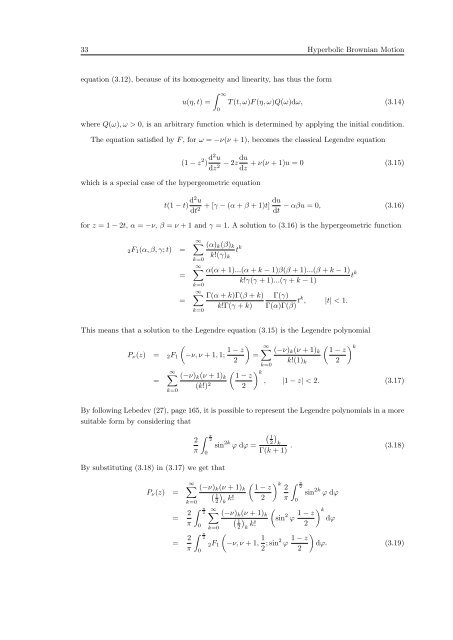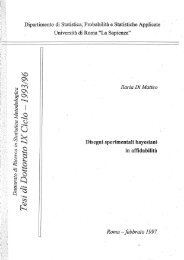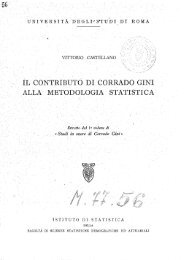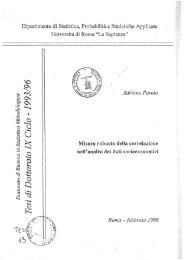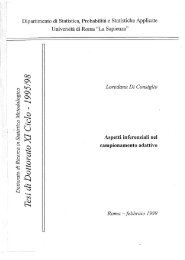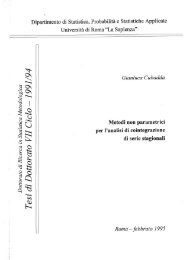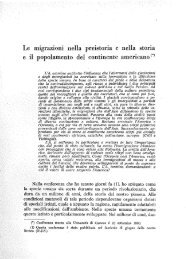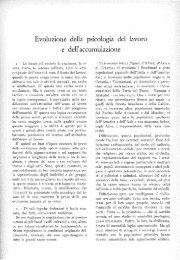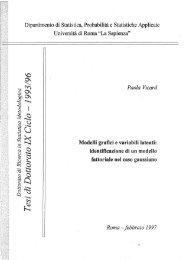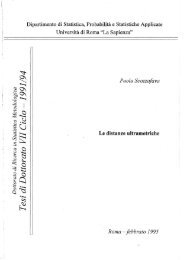Random Processes in Hyperbolic Spaces Hyperbolic Brownian ...
Random Processes in Hyperbolic Spaces Hyperbolic Brownian ...
Random Processes in Hyperbolic Spaces Hyperbolic Brownian ...
You also want an ePaper? Increase the reach of your titles
YUMPU automatically turns print PDFs into web optimized ePapers that Google loves.
33 <strong>Hyperbolic</strong> <strong>Brownian</strong> Motion<br />
equation (3.12), because of its homogeneity and l<strong>in</strong>earity, has thus the form<br />
u(η, t) =<br />
∞<br />
0<br />
T (t, ω)F (η, ω)Q(ω)dω, (3.14)<br />
where Q(ω), ω > 0, is an arbitrary function which is determ<strong>in</strong>ed by apply<strong>in</strong>g the <strong>in</strong>itial condition.<br />
The equation satisfied by F , for ω = −ν(ν + 1), becomes the classical Legendre equation<br />
which is a special case of the hypergeometric equation<br />
(1 − z 2 ) d2u du<br />
− 2z + ν(ν + 1)u = 0 (3.15)<br />
dz2 dz<br />
t(1 − t) d2u du<br />
+ [γ − (α + β + 1)t] − αβu = 0, (3.16)<br />
dt2 dt<br />
for z = 1 − 2t, α = −ν, β = ν + 1 and γ = 1. A solution to (3.16) is the hypergeometric function<br />
2F1(α, β, γ; t) =<br />
=<br />
=<br />
∞ (α)k(β)k<br />
t<br />
k!(γ)k<br />
k<br />
∞ α(α + 1)...(α + k − 1)β(β + 1)...(β + k − 1)<br />
t<br />
k!γ(γ + 1)...(γ + k − 1)<br />
k<br />
∞ Γ(α + k)Γ(β + k) Γ(γ)<br />
k!Γ(γ + k) Γ(α)Γ(β) tk , |t| < 1.<br />
k=0<br />
k=0<br />
k=0<br />
This means that a solution to the Legendre equation (3.15) is the Legendre polynomial<br />
Pν(z) = 2F1<br />
=<br />
∞<br />
k=0<br />
<br />
∞<br />
k 1 − z (−ν)k(ν + 1)k 1 − z<br />
−ν, ν + 1, 1; =<br />
2<br />
k!(1)k 2<br />
k=0<br />
(−ν)k(ν + 1)k<br />
(k!) 2<br />
k 1 − z<br />
, |1 − z| < 2. (3.17)<br />
2<br />
By follow<strong>in</strong>g Lebedev (27), page 165, it is possible to represent the Legendre polynomials <strong>in</strong> a more<br />
suitable form by consider<strong>in</strong>g that<br />
By substitut<strong>in</strong>g (3.18) <strong>in</strong> (3.17) we get that<br />
Pν(z) =<br />
π<br />
2 2<br />
s<strong>in</strong><br />
π 0<br />
2k <br />
1<br />
2 k<br />
ϕ dϕ = . (3.18)<br />
Γ(k + 1)<br />
∞ (−ν)k(ν + 1)k<br />
<br />
1<br />
k=0 2 k k!<br />
k 1 − z 2<br />
2 π<br />
= 2<br />
π ∞ 2 (−ν)k(ν + 1)k<br />
<br />
π<br />
1<br />
0<br />
2 k k!<br />
<br />
s<strong>in</strong> 2 ϕ<br />
k=0<br />
= 2<br />
π<br />
2<br />
2F1<br />
π 0<br />
<br />
−ν, ν + 1, 1<br />
2 ; s<strong>in</strong>2 ϕ<br />
π<br />
2<br />
0<br />
1 − z<br />
2<br />
s<strong>in</strong> 2k ϕ dϕ<br />
k 1 − z<br />
dϕ<br />
2<br />
<br />
dϕ. (3.19)


